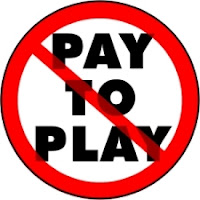It used to be that artists and bands faced pay-to-play gigs in only New York, LA and Nashville, but the practice has unfortunately spread to many more cities in the United States. For those musicians blissfully unaware of pay-to-play, that's where a club charges a band to play a gig as opposed to the traditional other way around. The club doesn't actually ask the band for money per se; they demand that the band buy a number of tickets, which they can then resell or give away, in the hopes of drawing a crowd.
For a venue, pay-to-play is usually a terrible strategy over the long term since it relies completely on the bands to draw a crowd, instead of the venue itself. In the case of a healthy venue with a strong built-in following, many from the venue's crowd will go to the club regardless of who's playing. Not so with a pay-to-play club, which has no following, and therefore those who go to the club have absolutely no loyalty to it. Eventually this means a slow death for the club, since it's not in the business of providing a positive experience for the fan; it's simply a middleman for the bands.
OK, we can all agree that pay-to-play doesn't really help anybody too much, and it's generally the scourge of the musician who wants to gig, but what if I told you this might happen to Internet radio as well? No kidding. If you want airplay, you gotta pay. Not under-the-table record promotion stuff where money and "favors" change hands like in the 50s, 60s, and 70s, but straight up paying for placement on the playlist.
Well, it appears that Internet streaming service called Earbits is trying a pay-to-play plan that charges for the honor of appearing on their playlist. Actually, it's a bit worse than that because bands or labels end up bidding for a space on the playlist, plus they get paid even less than the pittance that Pandora or other online radio stations pay so far.
What does an artist get for that privilege? Not much from what I can see. According to an article in Hypebot, when people "like" a song or band, it also shows up as a Like on Facebook as well. The artist can customize some of the visuals that the listeners sees to promote themselves as well. If listeners skip the song too much, it's jettisoned from the playlist. Earbits has a label to sign bands they like, and are doing licensing and branding deals for artists and bands, but so are a lot of other companies. So far Earbits has delivered only 4.5 million streams, which is a drop in the bucket compared to a service like Pandora. For the user, it's commercial-free (it better be) and customizable, and available on iPhone and Android devices.
I can understand the business model behind Earbits, which appears to be financed through a round of angel funding like Geoff Ralston (former CEO of LaLa, which Apple purchased a few years ago). It's new service (founded in 2011) that wants to be profitable as soon as possible, but this sets a terrible precedent. The last thing music needs is another play-to-play situation.
-----------------------------------
Help support this blog. Any purchases made through our Amazon links help support this website with no cost to you.
You should follow me on Twitter for daily news and updates on production and the music business.
Check out my Big Picture blog for discussion on common music, engineering and production tips and tricks.


1 comment:
I agree this is the worst case scenario... But this is also why it's so important people(engineers and serious A&R folks) started their own small labels with web support as soon as possible. "Pay-to-Play" won't find room to become a trend if Real Music is available elsewhere. These are Opportunity Days for solid alliances. We might not get another chance for a long time.
Post a Comment